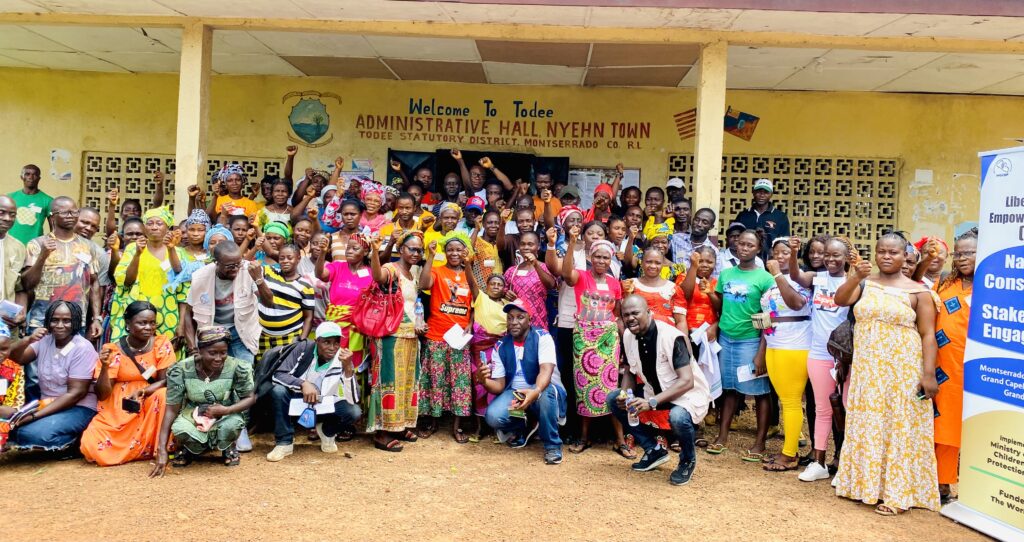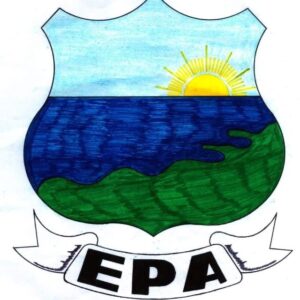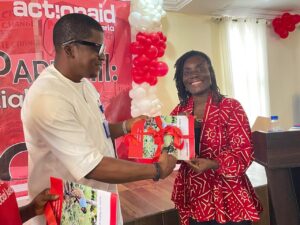Liberia Women Empowerment Project ends Three days National Consultation and Stakeholders Engagement in Rural Montserrado

Arthington, Montserrado: As part of processes leading to the implementation of the World Bank sponsored US$44.6 million project, the Liberia Women Empowerment Project has ended a Three Day National Consultation and Stakeholders Engagement in Rural Montserrado.
On June 6, 2024, the Liberia Women Empowerment Project, the implementing arm of the Ministry of Gender, Children and Social Protection representing the Liberian government, began a three-day intensive National Consultation and Stakeholders Engagement in Bentol City, Rural Montserrado County.
The LWEP continued the engagement on June 7, 2024 in Todee District and officially climaxed the activity on Saturday, June 8, 2024 in the City Corporation of Arthington, which hugely assembled citizens dominantly women from the five clans of the corporation and other close parts.
Rural Montserrado is one of six counties in Liberia that the LWEP will be implemented for the empowerment of women and girls.
The consultative sessions with communities within the named rural parts of the county focused on fostering a deep understanding of how local communities can effectively raise concerns, provide feedback, and lodge complaints regarding project implementation in their local localities.
The engagement served to disseminate vital information about the Liberia Women Empowerment Project (LWEP) to the targeted beneficiaries and counties, ensuring a collaborative and transparent approach to the project implementation.
However, hundreds of the stakeholders who attended the engagements, including women within Village Savings and Loans (VSLAs)groups, farmers, fishmongers and corporatives, religious and traditional leaders among others, lauds the government of Liberia for the project that will benefit marginalized groups in Liberia, women.
But they emphasized their discontent over their exclusion from being beneficiaries of similar initiatives in the past.
Outlining some of their major challenges, Tenneh Wilson, one of the spokespersons in Bentol City said “We have not been benefiting from some of these grants over the years. The big people in power have been prioritizing their personal interests while the local persons are the victims”.
In addition, Klubodo Gbo, the Traditional Head in Bentol who lamented in her Kpelle vernacular, asserted that the rural women often exert efforts to brush the farm but when the items needed come for their direct benefit, they are left in limbo, adding that the rural women have suffered all forms of domestic violence but she is of the conviction that the LWEP will serve them adequately.
Also in Todee and Arthingoton, the stakeholders named division among citizens, lack of trust, sustainability plans and transparency for VSLAs as key challenges they face among themselves and their authorities.
Following lengthy challenges, the stakeholders rallied the Project Management Unit (PMU) of the Liberia Women Empowerment Project (LWEP) to thoroughly scrutinize recruitment processes of beneficiaries of the loans for proper implementation by the Project.
They emphasized the need for a merit-based selection process of would-be beneficiaries, resulting in the smooth implementation of the program.
Elton O. Kollie of Todee District in Montserrado County Electoral District #1 stressed, “Nothing is straight without law and order. Therefore, there should be rules and regulations put in place and must be honored by the beneficiaries, a robust monitoring, and check and balance before and at the start of the project”.
They further recommended that the LWEP endeavor to do frequent visits on the program sites, ensuring that beneficiaries use the grant for the intended purposes and encourage those on the project that despite their challenges, they can make a positive impact on the society.
The local officials in the Bentol, Todee and Arthington have also called for the conduct of training sessions for the secretary and officials of the Village Saving and Loan Associations to ensure accountability and transparency, something they termed major challenges impeding the progress of many VSLAs.
The stakeholders at the same time called for the setting up of a specific body by the Liberia Women Empowerment Project to receive complaints regarding beneficiaries whose actions may undermine the smooth implementation of the project. They recommended that said body should fast-track impartial investigation, come up with findings and take the necessary decisions to serve deterrence.
Meanwhile, the National Coordinator for the Liberia Women Empowerment Project, Cllr. Margaret Nigba acknowledged the many challenges flagged by the stakeholders during the three days engagements and thanked them for the highly spirited reception received and willingness to successfully implement the project.
She quickly informed the citizens that to address those challenges faced by women and girls, the Liberian government signed the five years US$44.6 million loan agreement with the World Bank to empower women and girls, making them economically stable.
“The government’s quest to tackle Gender Based Violence against women and girls cannot be overemphasized. We have to create the necessary awareness, bringing all actors and stakeholders on board but trust me, this goal of the government supported by the World Bank cannot be achieved without an empowerment and sustainability plan, and that’s why this project has come to address,” Cllr. Nigba stressed.
While pledging the continued commitment of the Minister of Gender, Children and Social Protection, Gbeme Teta Horace-Kollie to fully promote President Joseph Nyuma Boakai’s vision aimed at improving the livelihood of the ordinary citizens, Cllr. Nigba urged the beneficiaries to take complete ownership of the project and sustain it.
“This is a grant. Which means when we give it to those of you will be selected; you will not pay back but remember that the Liberian government will pay this money back after the five years (2022-2027) to the World Bank because it is a loan. However, you can be a good citizen to help the government pay this money back. The way you can help is by using the money for the intended purposes, grow your business and pay your taxes for the government to generate revenue,” the LWEP National Coordinator noted.
Cllr. Margaret Nigba further told the stakeholders that the selection process for the grant does not require a tedious bureaucracy but stressed a transparent and tough scrutiny process to ensure the rightful and targeted people are recruited to benefit.
She assured the stakeholders that their recommendations will be considered for the effective improvement and implementation of the process, adding that the project implementers will collaborate with the local leaders for the full participation of everyone.
Also explaining how the grant will be given, Oliver Musa Lavalah, Economic and Livelihood Specialist on the Liberia Women Empowerment Project, said a well-designed template is set that individuals will fill in line with the criteria before recruitment.
Mr. Lavalah noted that the grant giving is divided into four categories, which include Individual Enterprises (IEs), Livelihood Groups (LGs), Village Savings and Loan Associations (VSLAs), and Producer Group (PG)/Farmer Based Organization (FBO).
According to him, the Individual Enterprises (IEs) focuses on a single individual who is doing his/her own businesses, adding that anyone who meets the criteria set in this category will benefit from a grant between US$1,000 to US$2,500 per the business plan.
The LWEP Economic and Livelihood Specialist indicated that the Livelihood Groups (LGs) are groups of households within a community who share similar businesses with a membership of 8 to 10 and will receive a grant between US$2,500 to US$4,000), stressing that such groups must have 70% women membership and 30% men.
The Village Savings and Loan Associations (VSLAs), according to him, this group of people who meet regularly to save together and take small loans from those savings and its activities run in a cycle in a year.
He added that the LWEP has the Village Evolving Fund – a special fund placed in the VSLAs saving box for the continuous availability of money for all members of the associations to take loan and pay back at a specific time, noting that this initiative will address the urgent needs of members.
Lavalah said each VSLA has a membership of 25 persons, indicating that the group stands to benefit from a grant between US$4,000 to US$8,000.
Also, category four is the Producer Group (PG)/Farmer Based Organization (FBO), which is a cooperative or a community based organization involved with production, processing, and valued addition, comprising a membership of 25 to 30 individuals and grant benefits of US$4,000 to US$8,000.
It was made emphatically clear that the project does not support any individual or group business that endangers climate change or poses threat to the environment, such as the burning of charcoal, deforestation among others as well as an individual or a group that is not doing any business.
The National Consultation and Stakeholders Engagement had in full attendance Representative Bernard Blue Benson of Montserrado County Electoral District #17, and representation from the office of Representative Rugie Yatu Barry of Electoral District #1.
The local government officials, including Ernest Gargar, Reliving Commissioner, Lincoln Yannyon Zorpon, Assistant Native Superintendent, Emmanuel David Fahnbulleh, District Superintendent in Todee District, Thomas Cassell, Commissioner, Chessmanburg Township, Mayor Designate, Romeo R. Clarke, City Corporation of Arthinnton, Madam Hawa Moore Younge, Chairperson for the City Corporation of Arthinnton, and Tankie T. Dukuly, Commissioner of Virginia Township among others.
They thanked the Liberian government for what they termed golden opportunity brought to their doorsteps, and promised their fullest cooperation for the implementation of the project as well as its sustainability.
About the Liberia Women Empowerment Project
The US$44.6 million World Bank sponsored project is out of the 15 counties, affecting six climate-vulnerable counties, specifically their rural parts: Montserrado, Gbarpolu, Bomi, Grand Cape Mount, Grand Gedeh and River Cess.
It targets approximately 267,200 people in over 750 communities as 36,000 of the beneficiaries stand to be supported from livelihood grants.
Components of the Liberia Women Empowerment Project
The LWEP is divided into five (5) components.
Component One (1) fosters Positive Social and Community Mobilization, which addresses social norms, mobilizing communities, and piloting improvements to basic social services at the community level.
Component Two (2) of the LWEP enhances Basic Services in Health and Education. At the community level, the project will pilot health and education sector activities to address local access to Adolescent Sexual and Reproductive Health services and GBV services among others.
Also under the Component Three (3), the project among other things focuses on building economic and social empowerment opportunities for women groups and individuals, including livelihood support.
Component Four (4) seeks to strengthen public institutions to advance gender equality, while at the institutional level, this component will build the Ministry of Gender, Children and Social Protection and Ministry of Agriculture capacity to generate sex-disadvantaged data.
Finally, Component Five (5) will finance the implementation, management, coordination, and oversight of the project and further fund knowledge management, including an impact evaluation to generate lessons learned about the project’s model and its potential for scaling on a wider basis.
Our reporter who covered the three days National Consultation and Stakeholders Engagement in Bentol, Todee and Arthington in Rural Montserrado County, said Gbarpolu County is the next in line for the conduct of the same engagement, followed by the other four counties.



